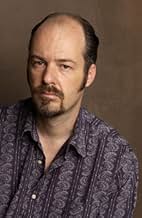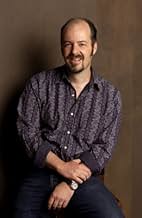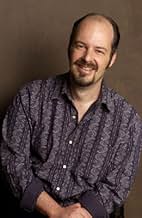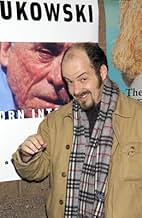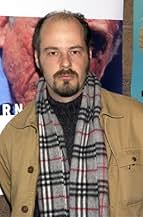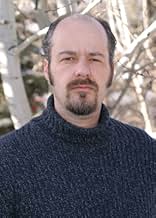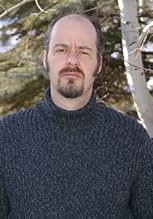Bukowski: Born into This
- 2003
- Tous publics
- 2h 10m
IMDb RATING
7.8/10
3.7K
YOUR RATING
Documentary on Charles Bukowski, author of 'Notes of a Dirty Old Man', 'Love Is a Dog from Hell', and the autobiographical novels, 'Women', 'Hollywood', and 'Post Office'.Documentary on Charles Bukowski, author of 'Notes of a Dirty Old Man', 'Love Is a Dog from Hell', and the autobiographical novels, 'Women', 'Hollywood', and 'Post Office'.Documentary on Charles Bukowski, author of 'Notes of a Dirty Old Man', 'Love Is a Dog from Hell', and the autobiographical novels, 'Women', 'Hollywood', and 'Post Office'.
- Awards
- 1 nomination total
Charles Bukowski
- Self
- (archive footage)
Michael D. Meloan
- Self
- (as Mike Meloan)
Featured reviews
If you go into this film without ever haven read Bukowski, it can be a jarring experience, but rewarding nonetheless. I love his stuff, most of it anyway, and never really had a chance to see him while he was alive. His book Post Office is perhaps the rawest and perfectly written piece of literature that I've ever read. The documentary does him justice in that it captures him in his perfect drunken, creative, and impossibly complex environment. Filmed over 10 to 15 years, it is not hero worship in any sense, it's as raw and revealing of a tortured, yet extremely funny individual as one can capture on film. We see his relationships with women unravel and patch up, the dusty daily grind of a regular job that he hates, his horrible childhood which would serve as material for Ham on Rye, his struggle with celebrity in the twilight of his life. Like all great artists Pryor, Lenny Bruce, Van Gogh, etc., Bukowski uses the pain and suffering of everyday life to his advantage, the result is a great revealing documentary that opens him up and makes him accessible to even his most die-hard fans. Much better than Barfly.
Genius, alcoholic, misogynist, poet, borderline psychopath. These are some of the words and labels branded on 'Beat' poet and author Henry Charles Bukowski Jr. during this extremely detailed and informative account of his life and work. For those unacquainted with his blue- collar genius, Bukowski started out drifting through meaningless jobs across America in the 1940's, drinking and writing all he could in his spare time. It wasn't until the 1960's when a collector of 1st editions and manager of a printing company offered to publish a collection of his works, when his career took off. He wrote possibly thousands of poems and was asked to write a novel. This work was Post Office, an deadpan account of his 16 years working for the U.S. Post Office.
Although he was, and still is, recognised as a 'Beat' writer (alongside the likes of Jack Kerouac and Alan Ginsberg), he was very much a man of his own style. Where Kerouac wrote about his personal journeys in a structured, detailed way, Bukowski wrote about mundane things in a straightforward way. It was very much poetry for the blue collar workers. In this documentary, John Dullaghan pieces together interview footage shot by the likes of Taylor Hackford and Barbet Schroeder, as well as pieces conducted by Italian and Belgian TV, to create a portrayal of a very complex and misunderstood man (there are also interviews with the likes of Sean Penn, Bono, Tom Waits and Harry Dean Stanton).
Like A Man Within (2010), which focused on fellow beat writer William S. Burroughs, Born Into This tries to tackle the various attributes that made the man. While telling a relatively chronological story of Bukowski, it covers the subjects of his childhood abuse at the hands of his father, his alcohol abuse, his treatment of women, his reaction to fame, and how this led to an influx of women begging for his 'purple onion' (as he called it). Running at 130 minutes, this is an incredibly (and necessarily) detailed documentary that really gets to the heart of the man who created some incredibly pieces of literature. I remember reading Post Office and Factotum when I was younger, and being blown away by its simplistic beauty and honesty. A must-see for any fans.
www.the-wrath-of-blog.blogspot.com
Although he was, and still is, recognised as a 'Beat' writer (alongside the likes of Jack Kerouac and Alan Ginsberg), he was very much a man of his own style. Where Kerouac wrote about his personal journeys in a structured, detailed way, Bukowski wrote about mundane things in a straightforward way. It was very much poetry for the blue collar workers. In this documentary, John Dullaghan pieces together interview footage shot by the likes of Taylor Hackford and Barbet Schroeder, as well as pieces conducted by Italian and Belgian TV, to create a portrayal of a very complex and misunderstood man (there are also interviews with the likes of Sean Penn, Bono, Tom Waits and Harry Dean Stanton).
Like A Man Within (2010), which focused on fellow beat writer William S. Burroughs, Born Into This tries to tackle the various attributes that made the man. While telling a relatively chronological story of Bukowski, it covers the subjects of his childhood abuse at the hands of his father, his alcohol abuse, his treatment of women, his reaction to fame, and how this led to an influx of women begging for his 'purple onion' (as he called it). Running at 130 minutes, this is an incredibly (and necessarily) detailed documentary that really gets to the heart of the man who created some incredibly pieces of literature. I remember reading Post Office and Factotum when I was younger, and being blown away by its simplistic beauty and honesty. A must-see for any fans.
www.the-wrath-of-blog.blogspot.com
I'd never heard Bukowski speak before. I'd seen the pictures and read the words. This hard-nosed writer surprised me as a very soft spoken, very sensitive artist. His intimidating face became friendlier and friendlier to me as the film progressed. With this movie, you get to see a lot of interview footage and a lot of personal commentary from close friends. You get your heart tugged at when his childhood is filled in for you. You laugh at his wit while handling interviewers. And you probably get thirsty looking at all the wine and beer he drinks. The only thing I didn't care for about this was the ever-so-pompous Bono sharing his 2 cents.
For Bukowski fans, this film is another of those items you have to possess but which will leave outsiders repulsed or appalled.
Most of the information in the film has been captured in various published interviews and biographies and in Bukowski's own autobiographical writings. But it is good to see the man moving about before our eyes again, driving his VW, visiting the track and the laundry, and his childhood home, where he 'reminisces' about the beatings his father administered with a razor strop. And it's interesting seeing some of Bukowski's lovers and associates again.
The quality of the archival footage is pretty poor, having been shot, it appears, with amateur 8mm equipment. We can be thankful it was shot at all, since who knew what value it might have. The sound, however, is quite good.
After many years of reading about Bukowski, I still haven't decided whether he was a sensitive soul driven to occasional episodes of egotistical pettiness and meanness by a bad childhood or just a self-centered ass who happened to have talent. However you view him in that regard, you cannot deny that he stuck by his vocation in spite of all. He personified the driven writer.
Most of the information in the film has been captured in various published interviews and biographies and in Bukowski's own autobiographical writings. But it is good to see the man moving about before our eyes again, driving his VW, visiting the track and the laundry, and his childhood home, where he 'reminisces' about the beatings his father administered with a razor strop. And it's interesting seeing some of Bukowski's lovers and associates again.
The quality of the archival footage is pretty poor, having been shot, it appears, with amateur 8mm equipment. We can be thankful it was shot at all, since who knew what value it might have. The sound, however, is quite good.
After many years of reading about Bukowski, I still haven't decided whether he was a sensitive soul driven to occasional episodes of egotistical pettiness and meanness by a bad childhood or just a self-centered ass who happened to have talent. However you view him in that regard, you cannot deny that he stuck by his vocation in spite of all. He personified the driven writer.
For those of us who haven't read any of his writing, Charles Bukowski, as seen in this informative, engaging new documentary by John Dullaghan, is a craggy deadbeat everyman, a working class L.A. writer with enough cult status to have some cool famous fan admirers. Lawrence Ferlinghetti, Harry Dean Stanton, Tom Waits, Bono of U2, and Sean Penn are the main guys who read lines or speak in admiring and affectionate terms of Bukowski. He also had a string of women, some wives, the last one, Linda Lee, a beautiful, classy lady with a tough and tender edge worthy of Lauren Bacall. More important yet for his reputation perhaps, he had an editor and publisher who put him on a monthly salary and brought out a lot of his books, John Martin of Black Sparrow Press, who saw Bukowski as an updated Whitman, a man of the people spewing wild poetry.
Somebody else told me he was the kind of writer you like if you're young and wild and drink a lot, the kind of tortured outsider persona that appeals to a 22-year-old, but that you wouldn't go back to. If you used to hit the sauce and gave it up you may feel Bukowski's prose has lost its flavor, like a doper's stoned insights. There are those who consider the writer a case of arrested development. Be that as it may, all his life Bukowski never wanted to be anything but a writer and never stopped writing, poems, then stories, finally novels. Two of his books most often mentioned are Post Office and Ham on Rye.
These may be young men's books with more rough flavor than depth of thought, but the fascination, for the young man, is with something solid: the hard nuggets of brutal boring existence, the courage of the deadbeat who's seen it all and bravely slogs on. First there's the six years, age six to twelve, of being beaten severely once a week with a razor strop by his ex-soldier father. An experience like that, Bukowski says, is good for a writer because it teaches you to tell the truth. Next he had ulcerative acne vulgaris as an adolescent and his face was covered with pullulating boils that left his face craggy and pitted for life -- though there are angles in some of the varied films from different decades that show him tanned and sunny, almost elegant-looking and possessed of an evident macho sexiness that explains in part the many women in his life. The other part is that he was a late bloomer as a ladies' man and took advantage of the fame of his later years to make up for lost time.
After the beatings and the acne Bukowski started visiting Skid Row to prepare for his future life. As his second decade wore on he wandered round the country staying at flophouses, rooming houses and cheap hotels, drunk, obviously, most of the time, throughout the Forties, excused by a psychiatrist from wartime military service. In the Fifties he settled into a minimal working stiff existence: employee at the post office, delivering mail (`living hell'); later on sorting it all night (which was so monotonous he'd get so he couldn't lift his arm), and, because he couldn't sleep, spending the day drinking and writing. Then, when a new addiction to gambling kicked in, he'd be at the racetrack playing the horses and play barfly in the afternoons brawling and flirting. He trashes the Barbet Schroeder movie from his screenplay about that part of his life, says Mickey Rourke is too theatrical and flowery; and he wrote a book called Hollywood after the filmmaking experience to show the dream factory was even stupider and faker than he'd ever imagined.
Eventually a regular column in an L.A. weekly got Bukowski noticed. Then John Martin stepped in with his financial and moral support and through the Seventies and Eighties the man's reputation and financial success grew to the point where he moved to a nice house in San Pedro with his lovely wife. He wasn't expected to live after developing severe bleeding ulcers in his thirties (1956) but he recovered and had a new burst of creativity. In his last few years he got tuberculosis, lost 60 pounds, and gave up heavy drinking. He died soon after being diagnosed with leukemia, at 73.
Watching this documentary you feel good because of the man's clarity and humor. Simplistic his expression may be, but it has the brilliant directness of the practiced writer who wears no mask. But despite all the tastes of his writing he and his celebrity admirers provide, I still don't know if I'd want to read some of his prolific oeuvre, and the picture of a similar, but sober, figure named Harvey Pekar in American Splendor (Bukowski too was wildly re-imagined by R. Crumb) seems more complex and multilayered, while no less down to earth. It's no secret that Harry Dean, Bono, Sean, and Mr. Waits are enthusiastic boozers themselves, and that's one big reason why `Hank' Bukowski's their bard and patron saint.
And if you compare Bukowski to another heavy user (but a more wildly adventurous one), William Burroughs, his mind and work don't seem as rich or as interesting as Burroughs', nor his life as intensely engaged with the issues of his times as the Beats'. Nevertheless, that's not to impugn the authenticity of his voice. There's nobody quite like Bukowski; hence, no doubt, his cult status, and the way people from other countries, places where the brawling and the articulate life are less often combined, find him so fascinating and so accessible.
Somebody else told me he was the kind of writer you like if you're young and wild and drink a lot, the kind of tortured outsider persona that appeals to a 22-year-old, but that you wouldn't go back to. If you used to hit the sauce and gave it up you may feel Bukowski's prose has lost its flavor, like a doper's stoned insights. There are those who consider the writer a case of arrested development. Be that as it may, all his life Bukowski never wanted to be anything but a writer and never stopped writing, poems, then stories, finally novels. Two of his books most often mentioned are Post Office and Ham on Rye.
These may be young men's books with more rough flavor than depth of thought, but the fascination, for the young man, is with something solid: the hard nuggets of brutal boring existence, the courage of the deadbeat who's seen it all and bravely slogs on. First there's the six years, age six to twelve, of being beaten severely once a week with a razor strop by his ex-soldier father. An experience like that, Bukowski says, is good for a writer because it teaches you to tell the truth. Next he had ulcerative acne vulgaris as an adolescent and his face was covered with pullulating boils that left his face craggy and pitted for life -- though there are angles in some of the varied films from different decades that show him tanned and sunny, almost elegant-looking and possessed of an evident macho sexiness that explains in part the many women in his life. The other part is that he was a late bloomer as a ladies' man and took advantage of the fame of his later years to make up for lost time.
After the beatings and the acne Bukowski started visiting Skid Row to prepare for his future life. As his second decade wore on he wandered round the country staying at flophouses, rooming houses and cheap hotels, drunk, obviously, most of the time, throughout the Forties, excused by a psychiatrist from wartime military service. In the Fifties he settled into a minimal working stiff existence: employee at the post office, delivering mail (`living hell'); later on sorting it all night (which was so monotonous he'd get so he couldn't lift his arm), and, because he couldn't sleep, spending the day drinking and writing. Then, when a new addiction to gambling kicked in, he'd be at the racetrack playing the horses and play barfly in the afternoons brawling and flirting. He trashes the Barbet Schroeder movie from his screenplay about that part of his life, says Mickey Rourke is too theatrical and flowery; and he wrote a book called Hollywood after the filmmaking experience to show the dream factory was even stupider and faker than he'd ever imagined.
Eventually a regular column in an L.A. weekly got Bukowski noticed. Then John Martin stepped in with his financial and moral support and through the Seventies and Eighties the man's reputation and financial success grew to the point where he moved to a nice house in San Pedro with his lovely wife. He wasn't expected to live after developing severe bleeding ulcers in his thirties (1956) but he recovered and had a new burst of creativity. In his last few years he got tuberculosis, lost 60 pounds, and gave up heavy drinking. He died soon after being diagnosed with leukemia, at 73.
Watching this documentary you feel good because of the man's clarity and humor. Simplistic his expression may be, but it has the brilliant directness of the practiced writer who wears no mask. But despite all the tastes of his writing he and his celebrity admirers provide, I still don't know if I'd want to read some of his prolific oeuvre, and the picture of a similar, but sober, figure named Harvey Pekar in American Splendor (Bukowski too was wildly re-imagined by R. Crumb) seems more complex and multilayered, while no less down to earth. It's no secret that Harry Dean, Bono, Sean, and Mr. Waits are enthusiastic boozers themselves, and that's one big reason why `Hank' Bukowski's their bard and patron saint.
And if you compare Bukowski to another heavy user (but a more wildly adventurous one), William Burroughs, his mind and work don't seem as rich or as interesting as Burroughs', nor his life as intensely engaged with the issues of his times as the Beats'. Nevertheless, that's not to impugn the authenticity of his voice. There's nobody quite like Bukowski; hence, no doubt, his cult status, and the way people from other countries, places where the brawling and the articulate life are less often combined, find him so fascinating and so accessible.
Did you know
- TriviaThe title of the film comes from Bukowski's poem, "Dinosauria, we", which was published in his book, "The Last Night Of The Earth Poems". Published in 1992, it was the final book of poetry released while the poet was still alive.
- ConnectionsEdited from Bukowski (1973)
Details
- Release date
- Country of origin
- Language
- Also known as
- Буковски
- See more company credits at IMDbPro
Box office
- Gross US & Canada
- $318,816
- Opening weekend US & Canada
- $27,095
- May 30, 2004
- Gross worldwide
- $329,097
- Runtime
- 2h 10m(130 min)
- Color
- Aspect ratio
- 1.33 : 1
Contribute to this page
Suggest an edit or add missing content

